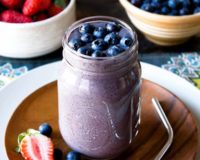What Is Asthma?
Asthma is a condition characterized by difficulty breathing and narrowing of the airways leading to the lungs (including the nose, nasal passageways, mouth and larynx). Common symptoms of asthma include coughing, wheezing, chest tightness, shortness of breath, and pain or pressure in the chest. In people who have asthma or allergies, the blocked or inflamed airways that cause asthma symptoms can usually be cleared with help from certain lifestyle changes and treatments. Eating a healthy diet supplies asthma sufferers with antioxidants and nutrients to combat environmental toxins, control inflammatory responses and reduce dietary triggers.
Some of the most beneficial foods to include in your asthma diet plan are:
Brightly colored carotenoid foods: This compound gives fruit and vegetables their orange or red color and can help reduce asthma attacks. Carotenoids are the basis of vitamin A, which is involved in the maintenance of healthy mucous membranes that line the air passageways. Severity of asthma correlates with low vitamin A, so increase your intake of things like root veggies, sweet potatoes, carrots, leafy greens and berries.
Vitamin E and vitamin C foods: Vitamin C is a powerful antioxidant and helps detoxify the body, which is why some research suggests that consuming more vitamin C reduces wheezing and inflammation. Vitamin C is found is leafy greens, citrus fruits, cruciferous veggies and berries. Vitamin E is another powerful antioxidant found in nuts, seeds and healthy plant oils.
Foods with magnesium: Low levels of magnesium are associated with increased risk of developing asthma, and increasing magnesium has been shown to reduce severity of asthma attacks and symptoms like muscle-spasming anxiety. It’s been found that magnesium can induce bronchial smooth muscle relaxation and allow air to get into and out of the lungs more easily. Sources include greens, nuts, seeds, beans, cocoa and certain ancient grains.
Broccoli, broccoli sprouts, Brussels sprouts and other cruciferous vegetables: These contain many antioxidants and a key compound called sulforaphane. Researchers from UCLA state, “A major advantage of sulforaphane is that it appears to increase a broad array of antioxidant enzymes, which may help the compound’s effectiveness in blocking the harmful effects of air pollution. This strategy may offer protection against inflammatory processes and could lead to potential treatments for a variety of respiratory conditions.”
Omega-3 foods: Omega-3 is mostly found in oily fish, such as mackerel, sardines, orange roughy, salmon, trout and tuna. Nuts and seeds can also provide a good dose. Omega-3s help lower the incidence of asthma significantly because they reduce airway inflammation and immune system reactivity.
By Dr. Josh Axe, DC, DMN, CNS










